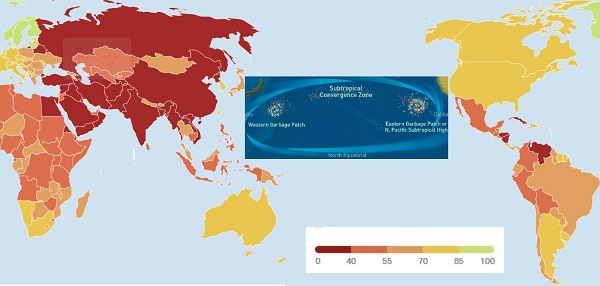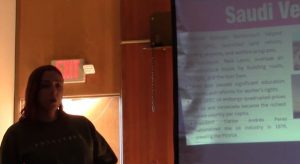2023 Index: AI is powering fake content industry
3 min read
With the rise of powerful new software fueling the fake content industry, here is your annual May 3 report on pollution in the digital ecosystem: It is as bad as a Great Pacific Trash Vortex, and on the same global scale.
The 2023 World Press Freedom Index rated the environment for journalism as “bad” in seven out of ten, and “satisfactory” in just three out of ten of the 180 ranked countries and territories.
Two-thirds of the countries (118 of 180) said political actors in their countries were often or systematically involved in massive disinformation or propaganda campaigns.
These actors are being aided by powerful software tools. “The difference is being blurred between true and false, real and artificial, facts and artifices, jeopardising the right to information,” the report said. “The unprecedented ability to tamper with content is being used to undermine those who embody quality journalism and weaken journalism itself.”
Reporters Without Borders compiles the Index each year and releases it on World Press Freedom Day.
The 2023 Index ranks Norway, Ireland, and Denmark at one, two, three. The worst at #180 was North Korea, followed by China, then Vietnam at #178.
The United States dropped to #45, reflecting the murders of journalists Jeff German in Las Vegas and Dylan Lyons in Orlando. U.S. respondents to the Index questionnaire were also negative about the environment for journalists, especially the legal framework at the local level and widespread violence.
Tonga (71.29) and Gambia (71.06) had similar scores to the United States (71.22).
The dropping “barometer” at the site was attributed to the rise of powerful new software.
“The remarkable development of artificial intelligence is wreaking further havoc on the media world, which had already been undermined by Web 2.0,” the report said. “Meanwhile, Twitter owner Elon Musk is pushing an arbitrary, payment-based approach to information to the extreme, showing that platforms are quicksand for journalism.
“The disinformation industry disseminates manipulative content on a huge scale, as shown by an investigation by the Forbidden Stories consortium, a project co-founded by RSF. And now AI is digesting content and regurgitating it in the form of syntheses that flout the principles of rigour and reliability.
“The fifth version of Midjourney, an AI programme that generates very high-definition images in response to natural language requests, has been feeding social media with increasingly plausible and undetectable fake “photos”, including quite realistic-looking ones of Donald Trump being stopped by police officers and a comatose Julian Assange in a straitjacket, which went viral.
This terrain has favored an increase in propaganda, as seen in Russia, the report said.
“In record time, Moscow has established a new media arsenal dedicated to spreading the Kremlin’s message in the occupied territories in southern Ukraine, while cracking down harder than ever on the last remaining independent Russian media outlets, which have been banned, blocked and/or declared ‘foreign agents.'”
The Index defines press freedom as “the ability of journalists as individuals and collectives to select, produce, and disseminate news in the public interest independent of political, economic, legal, and social interference and in the absence of threats to their physical and mental safety.”
In the 180 countries and territories ranked by RSF, these indicators are evaluated on the basis of a quantitative tally of abuses against journalists and media outlets, and a qualitative analysis based on the responses of hundreds of press freedom experts selected by RSF (including journalists, academics and human rights defenders) to more than 100 questions.
Whole Community News has asked Oregon Gov. Tina Kotek to declare an emergency in recognition of the dramatic decline in local news sources and the resulting negative impact on civil society. The Oregon Department of Emergency Management would identify areas of the state that have lost local news coverage, then identify and assign public information officers from throughout the nation to serve a limited-duration rotation in those areas, as is customary for ICS teams. The PIO resources would provide content to local news editors and work under their supervision.






